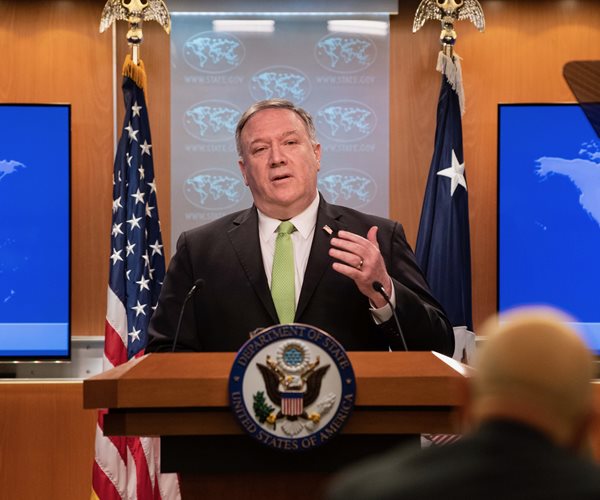Pompeo: Hong Kong no longer autonomous from China

From Newsmax
Secretary of State of Mike Pompeo has notified Congress that the Trump administration no longer regards Hong Kong as autonomous from mainland China and no longer deserves special treatment under U.S. law as it did while still under British law before July 1997.
Wednesday’s notification to lawmakers sets the stage for the U.S. to withdraw that preferential trade and financial status, which it has enjoyed since it reverted to Chinese rule in 1997.
“Hong Kong does not continue to warrant treatment under United States laws in the same manner as U.S. laws were applied to Hong Kong before July 1997,” Pompeo said in a statement.
Pompeo’s decision was not accompanied by a revocation of any specific privileges but comes amid calls for the U.S. and others to react against Beijing’s move to impose Chinese national security laws over the territory.
“Beijing’s disastrous decision is only the latest in a series of actions that fundamentally undermine Hong Kong’s autonomy and freedoms and China’s own promises to the Hong Kong people under the Sino-British Joint Declaration, a UN-filed international treaty,” Pompeo said. “No reasonable person can assert today that Hong Kong maintains a high degree of autonomy from China, given facts on the ground.
“After careful study of developments over the reporting period, I certified to Congress today that Hong Kong does not continue to warrant treatment under United States laws in the same manner as U.S. laws were applied to Hong Kong before July 1997,” Pompeo said.
“It is now clear that China is modeling Hong Kong after itself,” he added.
“The United States stands with the people of Hong Kong as they struggle against the CCP’s increasing denial of the autonomy that they were promised,” Pompeo said.
The “Hong Kong Human Rights and Democracy Act” approved by Congress and President Donald Trump last year requires the State Department to certify at least annually that the former British colony retains enough autonomy to justify the favorable U.S. trading terms that have helped it maintain its position as a world financial center.
Under it, officials responsible for human rights violations in Hong Kong could be subject to sanctions, including visa bans and asset freezes for top officials as well as imposing tariffs on goods coming from the former colony.
It now falls to Trump to decide to end some, all or none of the economic privileges Hong Kong currently enjoys.
China has warned that it would retaliate if the U.S. put sanctions on Hong Kong or interfered in its affairs.
“If anyone insists on harming China’s interests, China is determined to take all necessary countermeasures,” foreign ministry spokesman Zhao Lijian told reporters on Wednesday. “The national security law for Hong Kong is purely China’s internal affair that allows no foreign interference.”
China took back control of Hong Kong from the U.K. under an agreement known as “One Country, Two Systems,” in which it promised to give the former colony broad political and economic independence for 50 years. But under President Xi Jinping, China has steadily asserted more control over Hong Kong, touching off a wave of protests that only stalled as the coronavirus pandemic swept the globe.
The U.S. action hits Hong Kong after a year of often-violent protests and the Covid-19 pandemic that has slammed its economy.
Earlier Wednesday, thousands of protesters shouted pro-democracy slogans and insults at police in Hong Kong as lawmakers debated a bill criminalizing abuse of the Chinese national anthem in the city. The bill would make it illegal to insult or abuse the Chinese national anthem, “March of the Volunteers” in semi-autonomous Hong Kong.
Trump, asked about the possible sanctions at the White House on Tuesday, said his administration is “doing something now” that he would unveil later in the week.
“It’s something you’re going to be hearing about over the next — before the end of the week,” Trump said. “Very powerfully, I think.”
Under the U.S.-Hong Kong Policy Act of 1992, Washington agreed to treat Hong Kong as fully autonomous for trade and economic matters even after China took control. That meant Hong Kong was exempt from Trump’s punitive tariffs on China, can import certain sensitive technologies and enjoys U.S. support for its participation in international bodies like the World Trade Organization.
But the Hong Kong Human Rights and Democracy Act enacted last year gives the administration broad authority to impose sanctions or other punishments. The administration can also revoke Hong Kong’s special trading status if it chooses.
Such a decision, however, would have far-reaching consequences and jeopardize Hong Kong’s role as one of the world’s leading trade and banking hubs, so the Trump administration may start with smaller steps targeting Chinese Communist Party officials rather than moves that would have far-reaching economic consequences, particularly during the coronavirus pandemic.
This report contains material from The Associated Press, Reuters, and Bloomberg News.
© 2020 Newsmax. All rights reserved.
For more on this story go to: https://www.newsmax.com/politics/china-hong-kong-pompeo/2020/05/27/id/969222/?ns_mail_uid=6952f1f9-507d-4a20-8cc0-0a1db158d76e&ns_mail_job=DM114864_05272020&s=acs&dkt_nbr=010502645n9f





